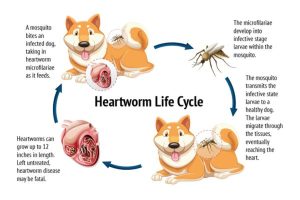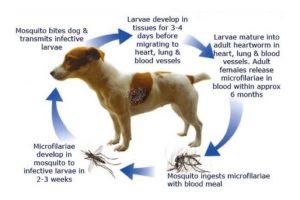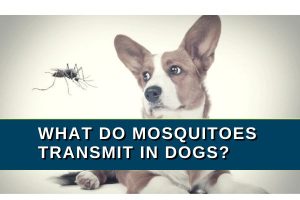Mosquitoes, notorious for their ability to transmit diseases, have long been a cause of concern for humans. However, their potential impact on animals, particularly dogs, has received relatively less attention. This article aims to provide an objective and impersonal analysis of the question: do mosquitoes bite dogs?

By examining existing scientific research and anecdotal evidence, we will explore mosquito behavior and attraction to dogs. Furthermore, we will discuss the potential risks associated with mosquito bites in dogs and highlight the importance of preventive measures.
To illustrate the significance of this issue, we begin with a hypothetical example: imagine a dog living in an area densely populated with mosquitoes without any protection against bites. This vulnerable canine could potentially experience adverse health effects caused by various pathogens transmitted through mosquito saliva.
Consequently, understanding the relationship between mosquitoes and dogs becomes imperative in order to safeguard these loyal companions from potential harm.
Key Takeaways
- Mosquito bites on dogs can lead to symptoms such as redness, swelling, and skin infections, as well as excessive scratching and difficulty breathing.
- Seeking prompt veterinary assistance is crucial when dealing with mosquito bites on dogs.
- Treatment options for mosquito bites on dogs include conventional treatments like antihistamines and topical ointments, as well as natural remedies such as apple cider vinegar and chamomile tea compresses.
- Preventive measures, such as keeping dogs indoors during peak mosquito activity times and using natural mosquito repellents, can significantly reduce the risk of mosquito-borne diseases in dogs.
Understanding Mosquito Behavior and Attraction to Dogs
A close-up shot of a mosquito hovering above a dog’s exposed skin, highlighting the insect’s proboscis moments away from piercing the dog’s flesh.

The behavior and attraction of mosquitoes towards dogs is a subject that warrants further investigation. Mosquitoes are known to be attracted to certain animals, including dogs, due to various factors such as body heat, movement, and the presence of carbon dioxide. Understanding mosquito feeding habits can provide insights into their attraction to canines.
Mosquitoes are primarily attracted to hosts based on the release of carbon dioxide from their breath. Dogs exhale carbon dioxide as part of their normal respiratory process, making them potential targets for mosquito bites. Additionally, mosquitoes are drawn to heat sources, and since dogs have a higher body temperature than humans, they may serve as attractive hosts for these insects.
Moreover, mosquito attraction may also be influenced by other factors such as body odor and sweat composition. The unique scent produced by dogs could play a role in attracting mosquitoes towards them. Furthermore, research suggests that mosquitoes are more likely to bite individuals who produce certain chemicals in their sweat.
Understanding the behavior and attraction of mosquitoes towards dogs is essential not only for the well-being of canines but also for preventing the transmission of diseases carried by these insects. Further studies should investigate specific aspects such as dog breeds that are more prone to mosquito bites or potential strategies for minimizing mosquito attraction in order to better protect our furry companions from these pesky insects.
Potential Risks of Mosquito Bites for Dogs
One potential consequence of mosquito bites on canines is the transmission of harmful diseases, such as heartworm, which acts as a silent invader slowly deteriorating the dog’s health. Mosquitoes are known vectors for heartworm larvae, which they transmit to dogs through their bite. Once infected, these larvae migrate and mature in the dog’s bloodstream, eventually reaching the heart and causing severe damage.

Mosquito bites can also lead to other potential health consequences for dogs. Some dogs may develop an allergic reaction to mosquito saliva, resulting in itchy skin, irritation, and discomfort. This allergic response can lead to excessive scratching and biting at the affected areas, potentially causing secondary infections.
To better understand the risks associated with mosquito bites on dogs, it is important to consider two subtopics:
Potential health consequences:
- Heartworm infection: Mosquitoes carry heartworm larvae and transmit them during a bite.
- Allergic reactions: Dogs may develop allergies to mosquito saliva.
Allergy development:
- Canine allergy development: Repeated exposure to mosquito bites can trigger an allergic response in some dogs.
- Secondary infections: Excessive scratching from allergic reactions can lead to skin infections.
By understanding these potential risks associated with mosquito bites on dogs, pet owners can take appropriate preventive measures and seek veterinary care if necessary.
Protecting Your Dog from Mosquito Bites
Protecting your dog from mosquito bites involves several key points.
First, consider using mosquito repellents specifically formulated for dogs to help repel mosquitoes.
Additionally, keeping your dog indoors during peak mosquito activity, such as dawn and dusk when mosquitoes are most active, can minimize their exposure.
Lastly, creating a mosquito-free environment in your yard by removing standing water and using mosquito control measures can further reduce the risk of mosquito bites for your furry friend.
Using mosquito repellents specifically formulated for dogs
Using mosquito repellents specifically formulated for canines significantly reduces the likelihood of dogs being bitten by mosquitoes. It is important for dog owners to protect their furry companions from mosquito bites, as these insects can transmit diseases such as heartworm.
Fortunately, there are several dog-friendly repellent options available in the market today. Natural mosquito repellents for dogs are particularly sought after by pet owners who prefer a more holistic approach to pest control. These natural repellents typically contain ingredients such as essential oils that repel mosquitoes without harming dogs. Some common natural ingredients used in these products include citronella, lemongrass, and peppermint oil.
When applying any type of mosquito repellent on dogs, it is crucial to follow the manufacturer’s instructions and avoid using human insect repellents on pets, as they may contain chemicals that could be toxic to animals.
Keeping your dog indoors during peak mosquito activity
Minimizing the exposure of your furry companion to mosquito-prone areas by keeping them indoors during peak mosquito activity can greatly reduce their risk of potential mosquito-borne diseases. Mosquitoes are most active during dawn and dusk, so it is advisable to keep your dog inside during these times. Additionally, providing a well-screened living environment can further protect your dog from mosquitoes entering the house. It is also important to eliminate any standing water sources in and around your home as they serve as breeding grounds for mosquitoes. To ensure complete protection, consider using alternatives to mosquito repellents such as citronella candles or natural sprays specifically formulated for dogs. By following these precautions, you can effectively keep your dog safe from mosquito bites and potential diseases they may transmit.
| Pros | Cons |
|---|---|
| Reduced risk of diseases | Limited outdoor activities |
| No discomfort for the dog | Increased indoor supervision |
| Cost-effective | Potential decreased exercise |
Creating a mosquito-free environment in your yard
Creating a mosquito-free environment in your yard can be achieved by implementing various strategies to reduce the presence of these disease-carrying insects. One effective approach is the use of mosquito control products. These products are designed to repel or kill mosquitoes, thus reducing their population in your yard. There are several types of mosquito control products available on the market, including sprays, candles, and traps. It is important to choose a product that is safe for both humans and pets.
In addition to using mosquito control products, natural mosquito repellents can also be utilized. These repellents often contain ingredients such as citronella oil, lemon eucalyptus oil, or lavender oil, which have been shown to effectively repel mosquitoes. Planting certain types of plants in your yard, such as marigolds or basil, can also help deter mosquitoes.
By incorporating these strategies into your yard maintenance routine, you can create a more enjoyable outdoor space for both yourself and your furry friend.
Recognizing and Treating Mosquito Bite Symptoms in Dogs
A close-up of a dog’s irritated and swollen skin, with visible red bumps caused by mosquito bites. The dog’s fur should be visible, emphasizing the importance of recognizing and treating mosquito bite symptoms in dogs.
Recognizing and treating mosquito bite symptoms in dogs requires a comprehensive understanding of the potential health risks associated with these bites. Mosquitoes are not only a nuisance but can also transmit diseases to our furry friends. It is important for dog owners to be able to identify the signs of mosquito bites and take appropriate measures to alleviate their pets’ discomfort.
When it comes to recognizing mosquito bite allergies in dogs, common symptoms include excessive scratching, redness, swelling, and even skin infections. Dogs that are particularly sensitive may develop allergic reactions such as hives or difficulty breathing. If any of these symptoms are observed, it is crucial to seek veterinary assistance promptly.
Treating mosquito bites on dogs can involve both conventional methods and natural remedies. Conventional treatments often include antihistamines or topical ointments prescribed by veterinarians. On the other hand, some pet owners prefer using natural remedies like applying diluted apple cider vinegar or chamomile tea compresses for relief.
To further emphasize the importance of prompt action, here is a table highlighting key points:
| Key Points | Importance |
|---|---|
| Recognize early symptoms | High |
| Seek veterinary assistance | Essential |
| Use appropriate treatments | Crucial |
| Consider natural remedies | Alternative |
By recognizing the symptoms and taking necessary steps, dog owners can effectively address mosquito bite allergies in their beloved pets while ensuring their overall well-being.
Importance of Preventive Measures
A vigilant dog relaxing on a shaded porch while a mosquito net elegantly drapes over the area. Highlight the significance of preventive measures against mosquito bites.
Implementing preventive measures is crucial in safeguarding the well-being of our canine companions from the potential health risks associated with mosquito bites. Mosquitoes are not only a nuisance, but they can also transmit various diseases to dogs, including heartworm disease and West Nile virus.
To protect our furry friends, here are four important preventive measures to consider:
Keep your dog indoors during peak mosquito activity times, such as dawn and dusk when mosquitoes are most active.
Eliminate standing water in your surroundings where mosquitoes breed, such as puddles or stagnant pools. Regularly clean and change water bowls and ensure proper drainage in outdoor areas.
Use natural mosquito repellents specifically formulated for dogs. These products often contain ingredients like citronella, lemongrass, or neem oil which repel mosquitoes without harmful chemicals.
Ensure your dog is on regular heartworm prevention medication prescribed by a veterinarian. This medication helps prevent heartworm disease caused by infected mosquito bites.
By implementing these preventive measures, we can significantly reduce the risk of our beloved pets contracting mosquito-borne diseases and ensure their overall health and well-being. Remember that prevention is always better than treatment when it comes to protecting our furry family members from the dangers of mosquito bites!
See also:
Dog Needs Exercise Buddies: Improve Your Dogs Mental and Physical Health
“Pure Balance Dog Food: Optimal Nutrition for Vibrant Health”
Purebred Dog Health Problems: Why Are They Sicker?
Frequently Asked Questions
Are all mosquitoes attracted to dogs or are there specific species that target them more?
Certain mosquito species may have a preference for biting dogs, although not all mosquitoes are equally attracted to them. To protect dogs from mosquito bites, one can consider using mosquito repellent specifically formulated for dogs or exploring natural remedies for alleviating mosquito bites on dogs.
Can dogs transmit mosquito-borne diseases to humans?
Dogs cannot transmit the Zika virus to humans. However, mosquito repellents designed for dogs can help protect them from mosquito bites. It is important to use products specifically formulated for dogs, as human repellents may be toxic to them.
How long does it take for mosquito bites on dogs to heal?
The healing process of mosquito bites on dogs varies depending on factors such as the severity of the bite and the dog’s individual immune response. Prevention measures, including insect repellents and removing standing water, can reduce mosquito exposure.
Do dog breeds with longer fur have a higher risk of mosquito bites?
Dog breeds with longer fur may have a higher risk of mosquito bites due to the increased surface area for mosquitoes to land and feed. The length of the dog’s fur can provide a favorable environment for mosquitoes, increasing the likelihood of bites.
Is there a specific time of day when mosquitoes are more likely to bite dogs?
Mosquitoes are more likely to bite dogs during dawn and dusk, as these are peak feeding times. Dogs in specific locations such as wooded areas or near stagnant water may be at higher risk. Protecting dogs from mosquito bites can be achieved through the use of repellents and eliminating potential breeding sites.
Conclusion
In conclusion, the intriguing relationship between mosquitoes and dogs is a topic that warrants attention. The potential risks of mosquito bites for our canine companions cannot be ignored. However, there are preventive measures that can be taken to protect our furry friends from these pesky insects.
By understanding mosquito behavior and attraction to dogs, we can better recognize and treat the symptoms of mosquito bites in dogs. It is essential to prioritize their well-being by implementing appropriate precautions.
After all, who would have thought that something as tiny as a mosquito could pose such a significant threat to our beloved pets?
